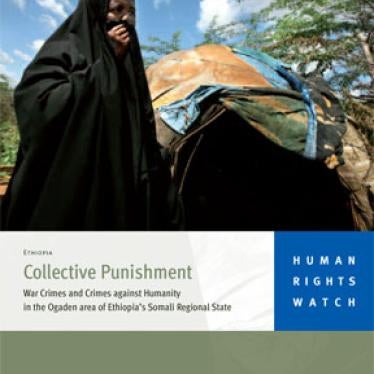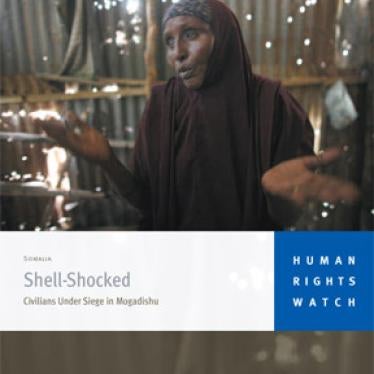(New York) - The United Nations Security Council should urgently press the Ethiopian and Somali governments to end the grave human rights abuses that are fueling the worsening humanitarian crisis in Somalia and eastern Ethiopia’s Ogaden region, Human Rights Watch said today.
On December 3, the UN under-secretary-general for humanitarian affairs, John Holmes, concludes a one-week visit to the Horn of Africa. Last month, UN officials described the situation in Somalia as the worst humanitarian crisis in Africa.
“The humanitarian suffering we see in Somalia and Ethiopia’s Somali region is the direct result of serious international crimes,” said Steve Crawshaw, UN advocacy director at Human Rights Watch. “Concerned governments and the UN Security Council need to press Ethiopia and Somalia to end these abuses and ensure accountability for their armed forces.”
The conflict in Somalia has steadily intensified since last December, when Ethiopian forces supporting the Somali Transitional Federal Government ousted the Islamic Courts Union from Mogadishu. Ethiopian forces quickly came under attack from a growing coalition of insurgent groups, and fighting in March and April 2007 forced as many as 400,000 residents of the city to flee their homes.
Both sides were responsible for war crimes during the fighting, including deliberate and indiscriminate attacks on civilians.
Clashes intensified again in November, driving tens of thousands of people from Mogadishu yet again. The November clashes have been marked by increasing brutality toward civilians, including summary executions and enforced disappearances of individuals by Ethiopian forces.
Aid workers and the media have also been targeted by the warring parties. Eight journalists have been killed this year. The transitional Somali government has repeatedly shut down media outlets. Three of Mogadishu’s independent radio stations and a human rights organization remain closed.
The Somali government has repeatedly harassed and obstructed humanitarian organizations trying to assist the displaced population. The mayor of Mogadishu, former warlord Mohamed Dheere, detained the head of the UN’s World Food Program (WFP) for five days in October, causing WFP to temporarily suspend food distributions to at least 75,000 people.
“Key governments are ignoring the rampant human rights abuses in Somalia at their own peril,” said Crawshaw. “Their action is a catastrophe for victims today, and it’s also likely to radicalize younger Somalis and create tomorrow’s fighters.”
The conflict in Somalia is also affecting the region. Since early this year, part of eastern Ethiopia’s Somali Regional State known as the Ogaden, which borders Somalia, has experienced a sharp escalation in a longstanding conflict between the Ethiopian government and the Ogaden National Liberation Front (ONLF), a rebel movement that claims it is fighting for self-determination for the region.
The ONLF attacked a Chinese oil installation in April, and Ethiopian military forces launched a brutal crackdown in June, targeting civilians perceived to be supporting the ONLF in five key zones of Somali Region. ONLF forces have also been responsible for abuses, particularly killings of suspected collaborators and the use of anti-vehicle mines in indiscriminate attacks on civilians.
Human Rights Watch has found that Ethiopian troops have used scorched-earth tactics to depopulate the rural areas and terrorize rural communities in the Somali Region. Their crimes include the burning of villages, public summary executions, sexual violence against women and girls, and confiscation of livestock – the main asset of the predominantly pastoralist population.
The Ethiopian government imposed a trade and commercial blockade on much of the affected region and expelled the International Committee of the Red Cross from Ethiopia’s Somali Region in July.
Although Ethiopia and the UN recently signed an agreement to increase humanitarian assistance to civilians in the country’s Somali Region, there are credible reports of ongoing abuses.
Human Rights Watch welcomed UN Under-Secretary-General John Holmes’s visit to the region and his call for further investigation of abuses in the Ogaden.
“Improving civilian access to humanitarian assistance in the Ogaden is a positive step,” said Crawshaw. “But unless the Ethiopian government lifts the trade blockade, ends these appalling crimes, and ensures accountability, it will be too little, too late.”







